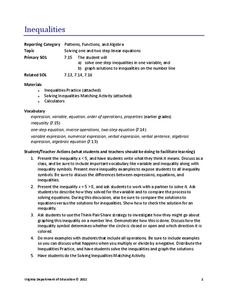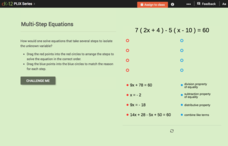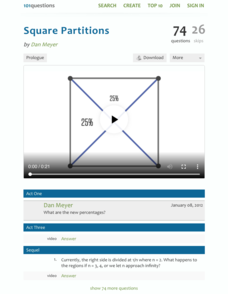PBL Pathways
Medical Insurance
Design a plan for finding the best health insurance for your money. Learners compare two health plans by writing and graphing piecewise functions representing the plan rules. Using Excel software, they create a technical report...
PhysEdGames
Fitness Relays
After separating the class into equal teams, the first player in each line runs to the opposite end of the gym to the fitness mat. Then, they do a certain number of reps of a certain exercise
PhysEdGames
Commandos
First create a starting line and ending line in the gym. After divvying up the class into equal teams, each team lines up in a straight row behind the starting point. Each player is lined up behind the other on their team. When...
PhysEdGames
Streets and Alleys
Assign one person as the cat and another person as a mouse. Have the rest of the class line up in equal rows and lines forming a 5x5 or 4x5 grid. Call out "streets" and the students forming rows hold hands and connect. Call out "alleys"...
PhysEdGames
Mat Tag
Choose two people to be taggers and give them each a dodgeball. Spread out the four mats in the shape of a diamond baseball on the gym floor. Assign an equal number of players to each mat. When signaled, runners run continuously to...
PhysEdGames
Keeper of the Castle
Set up four Hula Hoops in each corner of the gym that will be used as a base for each team. Use the center circle of the gym as the "castle" with a bunch of "treasure" in it. The treasure consists of a variety of pieces of...
PhysEdGames
Team Ball Tag
Divvy the class into equal teams and give each team a set of the same colored pinnies. Have players spread out around the gym and give each player a ball. The object of the game is to tag another team player with the ball. When a player...
CK-12 Foundation
Simplifying Rational Expressions: Sliding Solver
Build a strong understanding of simplified rational expression with your classes. An interactive lesson helps scholars discover the equality between the original expression and the simplified expression. Questions help individuals focus...
EngageNY
From Equations to Inequalities
Sometimes, equality just doesn't happen. Scholars apply their knowledge of solving equations to identify values that satisfy inequalities in the 34th installment of a 36-part module. They test given sets of numbers to find those that are...
Virginia Department of Education
Inequalities
Not all resources are created equal — and your class benefits! Scholars learn how to solve one-step inequalities using inverse operations. They complete an activity matching inequalities to their solutions.
CK-12 Foundation
DeMoivre's Theorem and nth Roots: The nth Roots of Unity
The nth roots of unity all have a magnitude of one. Scholars use the unit circle and DeMoivre's Theorem to find the complex roots of one and discover that the complex numbers all lie on the unit circle and are equally spaced around it...
Education Development Center
Interpreting Statistical Measures—Class Scores
Explore the effect of outliers through an analysis of mean, median, and standard deviation. Your classes examine and compare these measures for two groups. They must make sense of a group that has a higher mean but lower median compared...
CK-12 Foundation
Multi-Step Equations
It's important to know why each step in solving an equation works. Scholars order the steps and reasons when solving a multi-step equation. Solutions require using the distributive property, combining like terms, and using properties of...
GeoGebra
Yardwork in Segments
Stretch your knowledge of ratios to the coordinate plane. The interactive allows pupils to set the endpoints of a directed line segment and form a right triangle. Using rubber bands, users visualize the line segment divided into equal...
PhysEdGames
Capture The Ball
Play this fun twist on capture the flag with your class! After setting up the equipment, divide the class into two equal teams, and choose one person to be a guard on each team. The guard is the only person on either team allowed to...
Chemistry Collective
Virtual Lab: Determining the Solubility Product
No chemistry lab? No problem! Scholars use a virtual lab to determine the solubility product of four different chemicals. They then use the results of their experiments to see if higher solubility product values equal greater solubility.
Advocates for Youth
What Are Stereotypes and Gender Roles?
Living up to what society expects of you is difficult enough before you add the complications of sexual and racial prejudice. Discuss the difficulties faced by people in your country, neighborhood, and classroom with a series of...
US Institute of Peace
Governance, Corruption and Conflict Simulation on Nepal
Can your class help the people of Nepal? Scholars take an in-depth look into the social injustices and struggling economy of a country in turmoil during a multi-day role-playing exercise. After reviewing information on the problems...
McGraw Hill
Study Guide for Tuck Everlasting
Tuck Everlasting by Natalie Babbitt is a classic novel that readers have enjoyed for years. Resources within the study guide such as discussion and guided reading questions, extension activities, and graphic organizers aid...
101 Questions
Super Bear
Bear with your classes as they explore unit rate and proportions using gummies! Gummy bears come in many different sizes, including a 2,250-gram super bear! The task asks learners to determine how many regular bears and how many mini...
101 Questions
Blob Jump
For every action, there is an equal and opposite reaction. In the case of the blob, that reaction is a trip several feet in the air! Learners begin by watching the world-record blob jump. They then analyze the flight of the person using...
Howard Hughes Medical Institute
Molecular Structure of Fat
Bad fat, good fat, trans fat, food fat—are all fats created equal? Get to the bottom of the types of fat with a well-crafted presentation. The resource covers adipose tissue, lipids, trans fats, and many other substances that fall under...
101 Questions
Square Partitions
Challenge your classes while developing their problem-solving skills. A square is divided neatly into four equal triangles by its diagonals until one diagonal is moved from a vertex to the midpoint of one side. Now, scholars must devise...
University of North Carolina
Evaluating Print Sources
Not all sources are created equal, so how do you evaluate them? Writers learn how to evaluate print sources based on elements such as audience, tone, and argument in the sixth handout of 24 in the Writing the Paper series from the...
Other popular searches
- Gender Equality
- Equality and Inequality
- Property of Equality
- Gender Equity
- Equality Tolerance
- Properties of Equality
- Equality Problems Fractions
- Racial Equality
- Equality & Diversity
- Gender Equality Activities
- Gender Equality in Math
- Athletic Equality

























